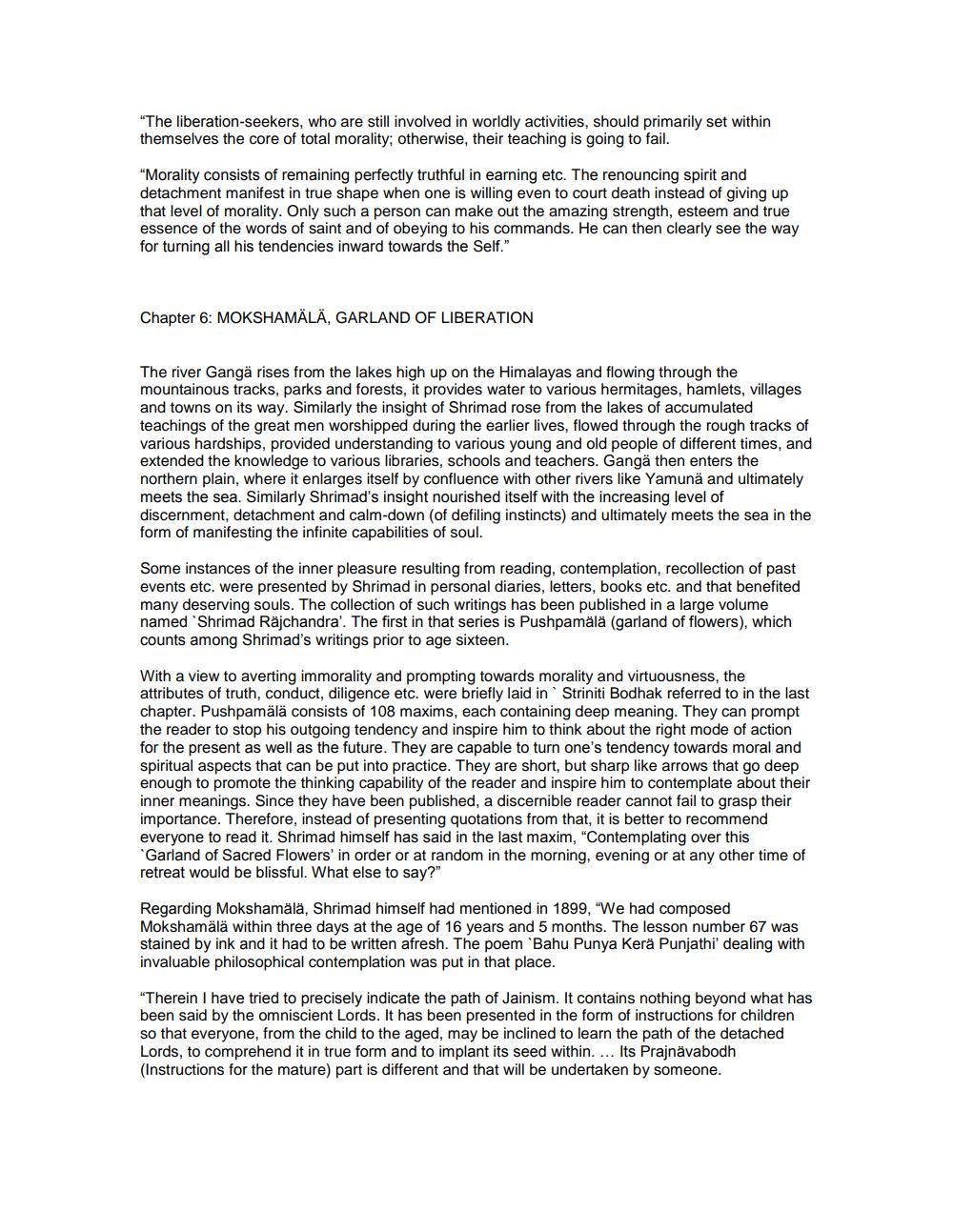________________
"The liberation-seekers, who are still involved in worldly activities, should primarily set within themselves the core of total morality; otherwise, their teaching is going to fail.
"Morality consists of remaining perfectly truthful in earning etc. The renouncing spirit and detachment manifest in true shape when one is willing even to court death instead of giving up that level of morality. Only such a person can make out the amazing strength, esteem and true essence of the words of saint and of obeying to his commands. He can then clearly see the way for turning all his tendencies inward towards the Self."
Chapter 6: MOKSHAMÄLÄ, GARLAND OF LIBERATION
The river Ganga rises from the lakes high up on the Himalayas and flowing through the mountainous tracks, parks and forests, it provides water to various hermitages, hamlets, villages and towns on its way. Similarly the insight of Shrimad rose from the lakes of accumulated teachings of the great men worshipped during the earlier lives, flowed through the rough tracks of various hardships, provided understanding to various young and old people of different times, and extended the knowledge to various libraries, schools and teachers. Ganga then enters the northern plain, where it enlarges itself by confluence with other rivers like Yamuna and ultimately meets the sea. Similarly Shrimad's insight nourished itself with the increasing level of discernment, detachment and calm-down (of defiling instincts) and ultimately meets the sea in the form of manifesting the infinite capabilities of soul.
Some instances of the inner pleasure resulting from reading, contemplation, recollection of past events etc. were presented by Shrimad in personal diaries, letters, books etc. and that benefited many deserving souls. The collection of such writings has been published in a large volume named 'Shrimad Räjchandra'. The first in that series is Pushpamälä (garland of flowers), which counts among Shrimad's writings prior to age sixteen.
With a view to averting immorality and prompting towards morality and virtuousness, the attributes of truth, conduct, diligence etc. were briefly laid in Striniti Bodhak referred to in the last chapter. Pushpamälä consists of 108 maxims, each containing deep meaning. They can prompt the reader to stop his outgoing tendency and inspire him to think about the right mode of action for the present as well as the future. They are capable to turn one's tendency towards moral and spiritual aspects that can be put into practice. They are short, but sharp like arrows that go deep enough to promote the thinking capability of the reader and inspire him to contemplate about their inner meanings. Since they have been published, a discernible reader cannot fail to grasp their importance. Therefore, instead of presenting quotations from that, it is better to recommend everyone to read it. Shrimad himself has said in the last maxim, "Contemplating over this Garland of Sacred Flowers' in order or at random in the morning, evening or at any other time of retreat would be blissful. What else to say?"
Regarding Mokshamala, Shrimad himself had mentioned in 1899, "We had composed Mokshamälä within three days at the age of 16 years and 5 months. The lesson number 67 was stained by ink and it had to be written afresh. The poem 'Bahu Punya Kerä Punjathi' dealing with invaluable philosophical contemplation was put in that place.
"Therein I have tried to precisely indicate the path of Jainism. It contains nothing beyond what has been said by the omniscient Lords. It has been presented in the form of instructions for children so that everyone, from the child to the aged, may be inclined to learn the path of the detached Lords, to comprehend it in true form and to implant its seed within. ... Its Prajnävabodh (Instructions for the mature) part is different and that will be undertaken by someone.




